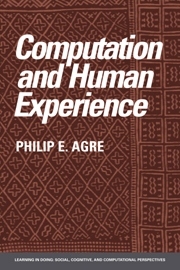Book contents
- Frontmatter
- Contents
- Preface
- 1 Introduction
- 2 Metaphor in practice
- 3 Machinery and dynamics
- 4 Abstraction and implementation
- 5 The digital abstraction
- 6 Dependency maintenance
- 7 Rule system
- 8 Planning and improvisation
- 9 Running arguments
- 10 Experiments with running arguments
- 11 Representation and indexicality
- 12 Deictic representation
- 13 Pengi
- 14 Conclusion
- Notes
- References
- Author index
- Subject index
9 - Running arguments
Published online by Cambridge University Press: 07 December 2009
- Frontmatter
- Contents
- Preface
- 1 Introduction
- 2 Metaphor in practice
- 3 Machinery and dynamics
- 4 Abstraction and implementation
- 5 The digital abstraction
- 6 Dependency maintenance
- 7 Rule system
- 8 Planning and improvisation
- 9 Running arguments
- 10 Experiments with running arguments
- 11 Representation and indexicality
- 12 Deictic representation
- 13 Pengi
- 14 Conclusion
- Notes
- References
- Author index
- Subject index
Summary
From plans to arguments
Critical analysis is necessary and valuable, but the progress of intellectual work always turns out to be underlain by deep continuities. Technical work in particular will always pick up again where it left off, hopefully the wiser but nonetheless constrained by the great mass of established technique. Critics interrogating the existing techniques may discover a whole maze of questionable assumptions underneath them, but that discovery in itself does not make the techniques any easier to replace. I will not try to throw the existing techniques of AI out the window and start over; that would be impossible. Instead, I want to work through the practical logic of planning research, continuing to force its internal tensions to the surface as a means of clearing space for alternatives. My starting place is Fikes, Hart, and Nilsson's suggestion (quoted in Chapter 8) that the construction and execution of plans occur in rapid alternation. This suggestion is the reductio ad absurdum of the view that activity is organized through the construction and execution of plans. The absurdity has two levels. On a substantive level, the distinction between planning and execution becomes problematic; “planning” and “execution” become fancy names for “thinking” and “doing,” which in turn become two dynamically interrelated aspects of the same process. On a technical level, the immense costs involved in constructing new plans are no longer amortized across a relatively long period of execution. Even without going to the extreme of constant alternation between planning and execution, Fikes, Hart, and Nilsson still felt the necessity of heroic measures for amortizing the costs of plan construction. These took the form of complex “editing” procedures that annotated and generalized plans, stored them in libraries, and facilitated their retrieval in future situations.
- Type
- Chapter
- Information
- Computation and Human Experience , pp. 160 - 178Publisher: Cambridge University PressPrint publication year: 1997



